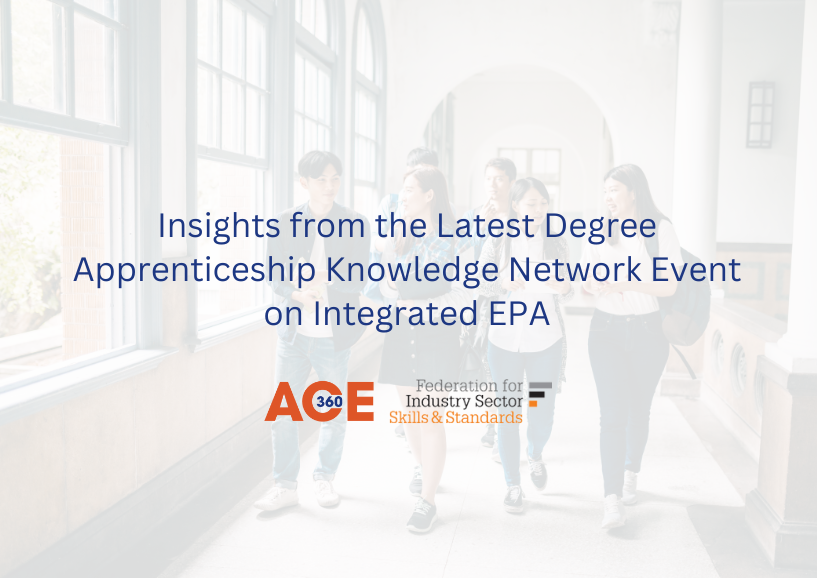Insights from the Latest Degree Apprenticeship Knowledge Network Event on Integrated EPA

In a collaborative effort, FISSS with ACE360, supported the University Vocational Awards Council (UVAC) Knowledge Network event on the 25th of July, focused on End Point Assessment (EPA) and External Quality Assurance (EQA) for degree apprenticeships.
The event brought together experts and professionals from the field to explore and discuss the intricacies of degree apprenticeships, with a particular emphasis on quality assurance of EPA.
Monitoring Checks and Evidence Trails:
A key theme of the event was the significance of monitoring checks and evidence trails in the EPA process. Ensuring quality assurance in EPA necessitates robust evidence of regulatory compliance at all levels within institutions. This includes stringent operational processes, consideration of academic aspects, and transparent guidance materials. Furthermore, with apprenticeship assessment differing from traditional degree programs, dedicated systems and processes are essential. These systems must be capable of accommodating non-standard workflows, such as reasonable adjustments, resits, retakes, and appeals, while also providing comprehensive evidence trails.
Guidance from Key Organisations:
Delegates at the event received crucial guidance from the Institute for Apprenticeships and Technical Education (IfATE). IfATE emphasised the importance of strict adherence to assessment plans, which form the backbone of quality assurance in degree apprenticeships. For comprehensive guidance on assessment plan requirements, attendees were directed to IfATE’s website.
The Office for Students (OfS) is actively communicating changes in assessment plans and will be advising on updates to External Quality Assurance (EQA) guidance over the next few weeks. The event underscored the importance of raising clarifications with OfS when needed, including interpretations of assessment plans and challenges in EPA delivery. OfS is dedicated to evaluating EPA issues and determining appropriate actions, which may include recommendations for changes to assessment plans.
The Quality Assurance Agency (QAA) reaffirmed its commitment to supporting degree apprenticeships through various projects and resources. In the near future, QAA will launch a degree apprenticeships toolkit to enhance understanding of fundamental elements of Degree Apprenticeship (DA) provision. Furthermore, QAA offers consultancy services for expert analysis, advice, and development.
Independence in EPA:
A significant challenge identified at the event was achieving and demonstrating independence in EPA. Clear policies to prevent conflicts of interest were recommended. These policies should extend to assessors and employers. The event highlighted the common challenge of finding qualified assessors, particularly those with industry and higher education assessment experience, and, in some cases, master’s degrees for Level 6 apprenticeships. Strategies to address this shortage include collaboration among institutions to pool assessors, while also ensuring compliance with OfS regulations.
Examples of Good Practice:
Institutional examples shared during the event showcased effective strategies in ensuring independence in EPA. These included:
- Clear conflict of interest policies with reference to EPA and professional upskilling.
- Recruitment strategies that track internal staff involvement, cover external recruitment, or offer consultant contracts.
- Resource planning to determine a realistic number of assessments per assessor.
- Robust training programs for Independent Assessors (IAs), covering assessment practices and grading.
- Organisational structures that separate delivery and EPA, with external examiners overseeing assessors.
In summary, the recent Degree Apprenticeship Knowledge Network Event on Integrated EPA provided a platform for invaluable insights and discussions to take place between subject matter experts and leaders involved with Degree Apprenticeships, with independence in EPA and adherence to assessment plans emerging as key themes.
As universities navigate the evolving landscape of degree apprenticeships, the guidance from IfATE, OfS, and QAA will be indispensable. FISSS with ACE360, working in collaboration with UVAC extends its gratitude to all participants for contributing to the success of this event. Together, they continue to support sharing of information and best practice in degree apprenticeship provision and look forward to meeting delegates in person at the next UVAC Knowledge Network meeting in October and the National Conference in November.











Responses